Random bits from FOSDEM 2020

On 1-2 February I attended FOSDEM. This is only the second time I’ve attended this annual event in Brussels, and it’s just about as crazy as it was last year with over 8000 attendees and 835 talk/BoF/etc sessions.
I did all the typical FOSDEM stuff. Visiting booths, attend a few talks and BOFs, catch up with a few people, meet some new ones I’ve only known on IRC, signed a few GPG keys and consumed a whole lot of club mate, fries, chocolate and waffles.
Below follows some random bits that I happen to remember or took photos of. They are in no order of particular importance. I wish I got some photos with some of the cool people I so seldomly see, if I ever attend an event like this, I’ll pay some more attention to this.
Axiom Free hardware camera
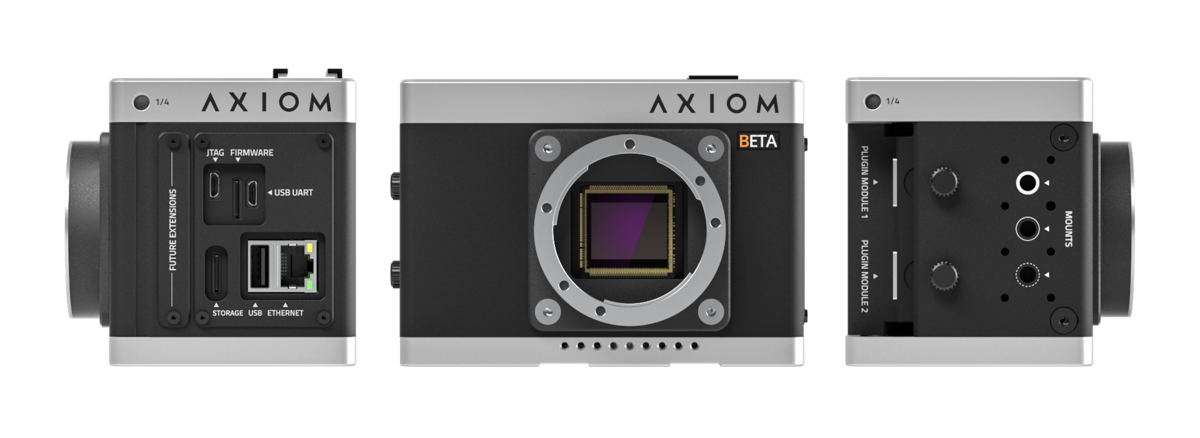
I attended a talk about the Axiom free video camera along with a few members of the DebConf video team. It’s completely free hardware, professional grade and overall very impressive. Here’s a YouTube link to some sample footage taken with an earlier model of the camera which they displayed at FOSDEM.
All the nice things above come at a cost, kits currently range from around £4000 to £6000. And then you have to assemble it yourself on a component level. It’s not likely that we’ll ever use the main Axiom camera for DebConf, it’s really better suited for projects that are creating film-grade content or for academic purposes where you might want to capture something very specific at a high colour depth or frame rate (it can do up to 300fps).
Fortunately, there’s a project by some talented developers to create a smaller version of the camera (the Axiom Micro) which may be a lot more appropriate for DebConf. We have a lot of problems with the current hardware stack, like needing to source a whole bunch of local PCs and shipping a whole lot of hardware to new and interesting countries every year all with their own unique logistical problems. Using free camera hardware could go a long way in helping reduce the sheer amount of hardware needed for videoing a DebConf without having to lose any functionality. It’s probably quite a bit of time before this could even yet be considered as a viable option, but it’s nice to get a sneak peek of what might be possible in the not-so-distant future.
Godot Game Engine
It’s been about 20 years since I wrote my last game, and I’ve been toying around with the idea of writing a new and very niche adventure game for the last two years. In the last few months, I’ve been shopping around for game engines. I came very close to just settling on making it a Flask app and playable in a web browser. That might give me some excuse to play with Brython too, which is a Python interpreter that runs in JavaScript.
In recent months, I’ve been reading more and more about Godot, (at FOSDEM I learned that upstream pronounces this as “guh-dough”, but they’re fine with you pronouncing it anyway you want).
What I like about it:
- Very flexible game engine for both 2D and 3D graphics
- Fully free software with no gotchas
- Widely cross platform (compile for Windows, Linux, macOS, Android, webassembly and more)
- Nice built-in scripting language called gdscript (syntax similar to Python) (You can also programming in a lot of existing languages like C++, Rust, C#, Python, etc)
- It has a fully integrated development environment in which you can create your games
- Its IDE and runtime engines are already packaged in Debian and even in stable (Debian 10) already
I could go on, but at this point I’m personally sold on these core points already. Here is a nice video comparing some of its pros and cons, it’s biggest downside is that it’s 3D performance isn’t that great compared to the other major 3D gaming engines, but a lot of work is going into ironing out a few kinks in that area.
I liked visiting their booth and finding out more about the system, unfortunately I seemed to have lost my photo of their booth, but fortunately I bought this really cool t-shirt, I hope to find some time to properly dive into Godot soon.
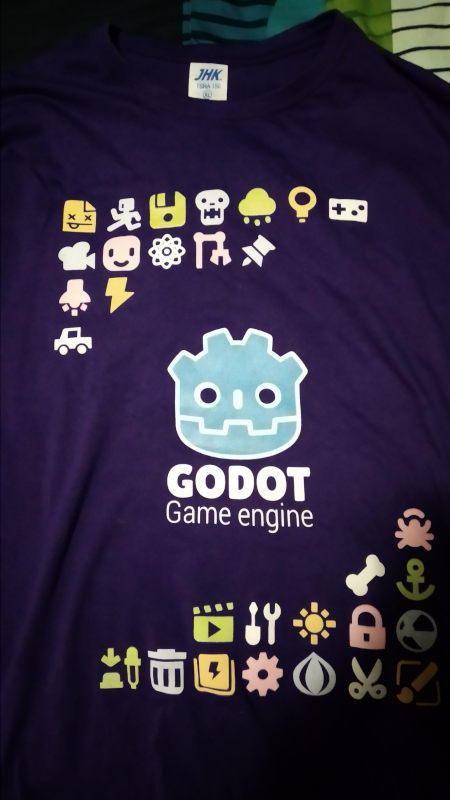
On the last day of FOSDEM, news broke that they received an EPIC megagrant that they applied for. That’s quite some news since they are in some ways a competitor to EPIC’s own game engine, but I think they did the right thing and it makes sense for them to have a good relationship with an open source engine such as Godot. Anyway, read more about Godot on their website.
Librem 5 BoF
When the crowdsourcing kicked off for the Librem 5 (a fully free phone created by Purism), it didn’t take me long to decide that I’ll order one. This was quite some time ago and it seems that I may actually receive my long-awaited device in late March / early April. There was a Librem 5 BoF at FOSDEM, so of course I went.
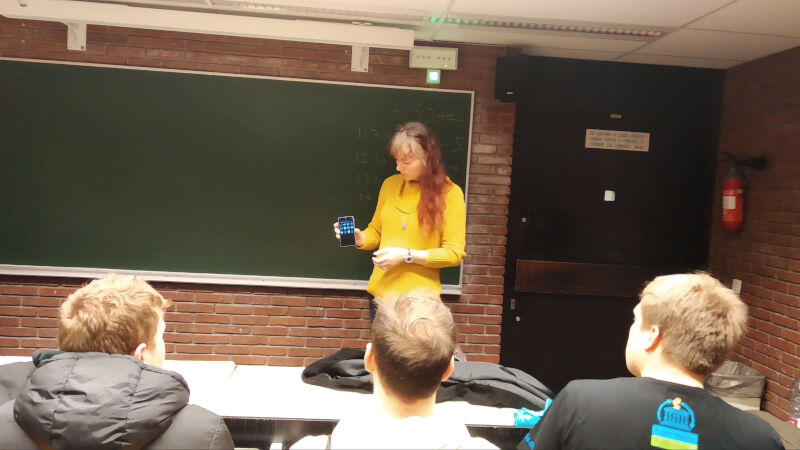
It was nice to finally hold one of these devices and see what it’s really like. Many on-line reviews complained that it’s bulky. It is indeed bulky compared to a sleek modern phone, but it’s not nearly as thick as something like the Nokia N800/N900, which was probably the closest thing to this phone that existed before. It’s really pleasant to hold and will fit comfortably in cargo pants. Unfortunately it did feel a bit warm (not quite hot, but warm enough that it would distract me if it got that warm in my pocket). They hope to improve power management drastically by the end of the year. One of the biggest challenges is that all the major components are discrete, separate chips. This is done by design and makes the phone more modular, but it does make power saving a bigger challenge since coordinating timing and wake-ups between these discrete chips takes a lot more finesse than if they were integrated in a single chip.
I asked about their roadmap and whether they’ll start working on the next version of the phone now that this phone is pretty much done on a hardware level. Fortunately for owners of this model, their focus will remain on the current Librem 5 and to optimize it, so we shouldn’t expect any new models or major development on a new generation of Librem 5 hardware for the next 2 years or so.
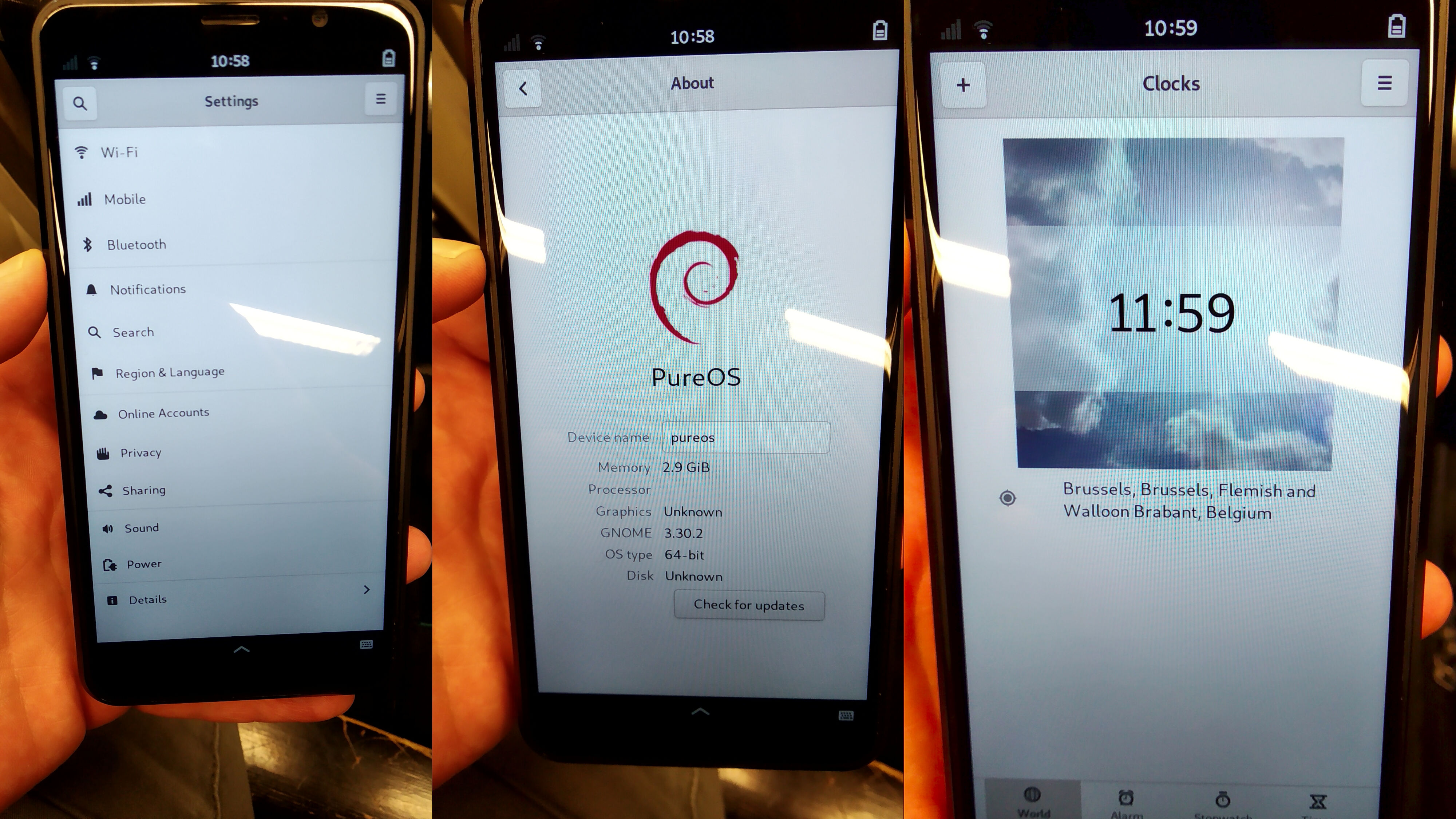
I just played with the device for about two minutes. The Gnome apps are fast and responsive and just feel natural on this form factor. I’m looking forward again to having a pocket computer that can run Debian. I hope they improve the terminal app a bit, I felt that it lacked some buttons. On Android I use JuiceSSH which makes it really easy to navigate typical terminal apps like mc, htop and irssi.
I asked whether they’re thinking of creating any accessories for this phone, since a keyboard-case would be nice. They said that they’re certainly looking into it and will be releasing some limited accessories for the phone, but couldn’t yet elaborate on exactly what that would be yet.
Loongson development board
Loongson made some Loongson 2K Pi boards available to Debian Developers. I requested one and thanks to the two DDs who co-ordinated to bring it in from China I got my one at FOSDEM. It’s a MIPS64 based CPU with a Vivante GC1000 Series GPU. I got the board with a 16GB SSD, a nifty mountboard and a 5V/3A power adaptor. It’s got dual gigabit ethernet ports, space for a wifi card, lots of GPIO pins and even a PCIe slot.
I’ve never tried a proper Debian system on a MIPS platform before. Unfortunately you need a special kernel to boot this, but that will hopefully change in the future. A standard Debian mips64el userland should run fine on it, I’ll try it out over the weekend. I couldn’t help myself from assembling the kit before finishing this blog post. Even if it ends up not being very useful for Debian development, I’ll certainly be able to find a use for it with all the extensibility it has. I’ll do an update blog post and/or video about it when I’ve played with it a bit.
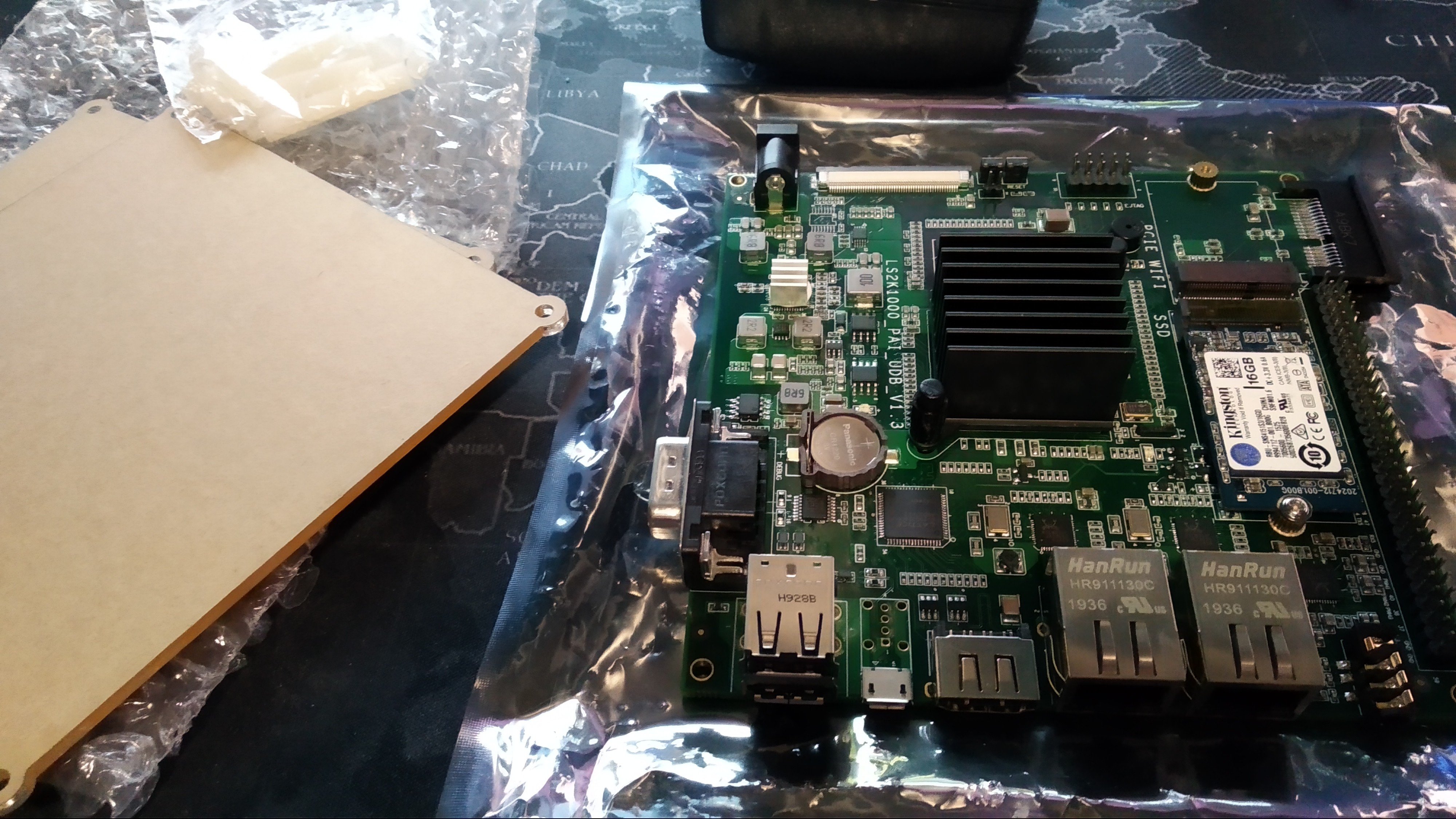
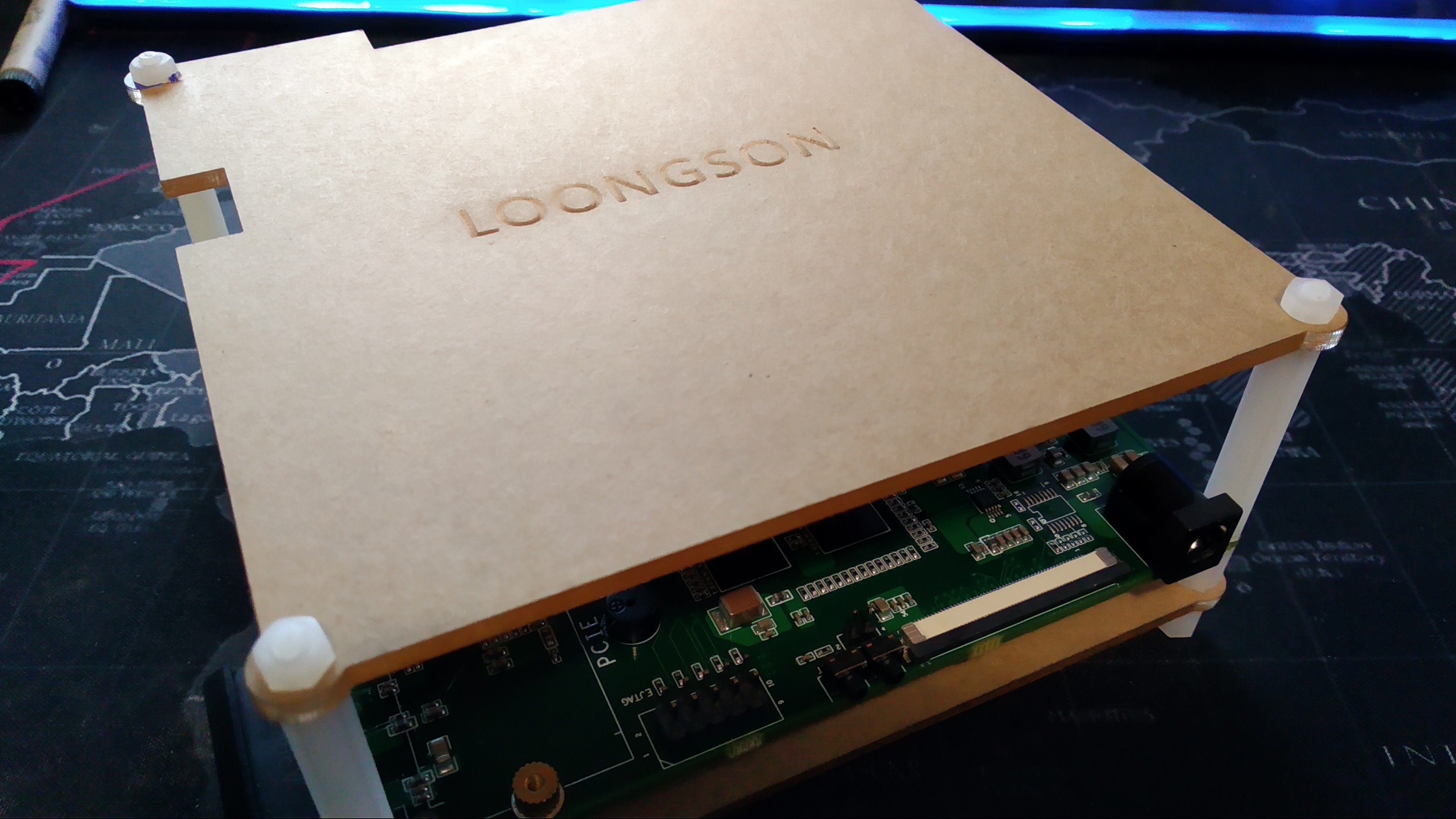
Gentoo prefixes
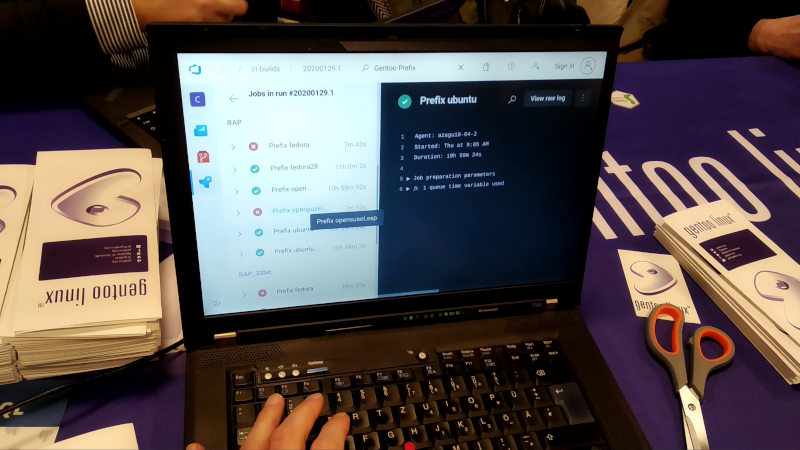
At the Gentoo stand, I learned about Gentoo prefixes. This allows you to set up a directory on an existing Linux (or in some cases, even on other) systems where you can emerge from Gentoo ports. You can then just add this prefix to your path to easily run applications from it. This is especially useful for people who don’t have root access on their computer but might need access to some additional software. Or maybe they want a newer (or older) version that’s available on their system release.
I’m kind of surprised that there’s been less talk about enabling some kind of user-mode APT in Debian where you can get something similar to a Gentoo prefix, but where you can install package from archives just for your user. I guess the interest is currently too low and the amount of work too much. When I find some time to properly play with Gentoo prefixes I’ll look into how much work it is to just package its scripts for Debian, someone might find it useful.
Perl6 / Raku
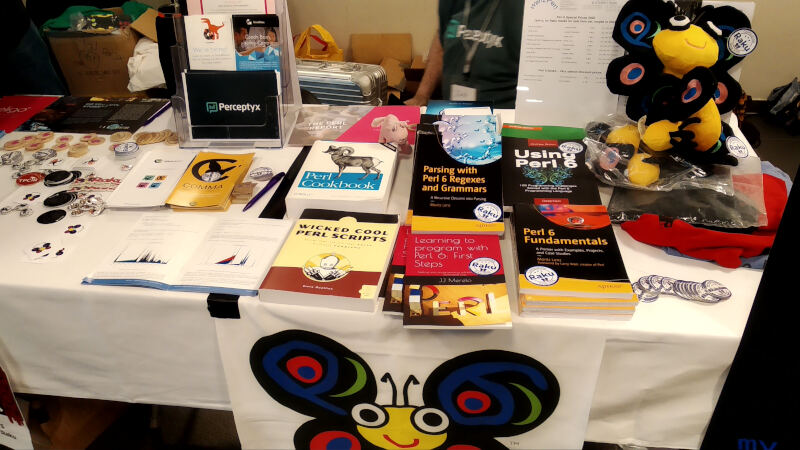
At the Perl booth I bought a book on getting started with Perl6 (Raku). It’s a thin book and was just €5 so I thought I might as well give it a shot. I made it through a quarter of the book by the end of FOSDEM and it seems I have since misplaced the book. I found quite a few aspects of the language interesting, but it seems that it’s still way to easy to write modern Perl/Raku that would be later considered hard to read. I’ll at least finish up the book if it emerges again.
ReactOS running on real hardware
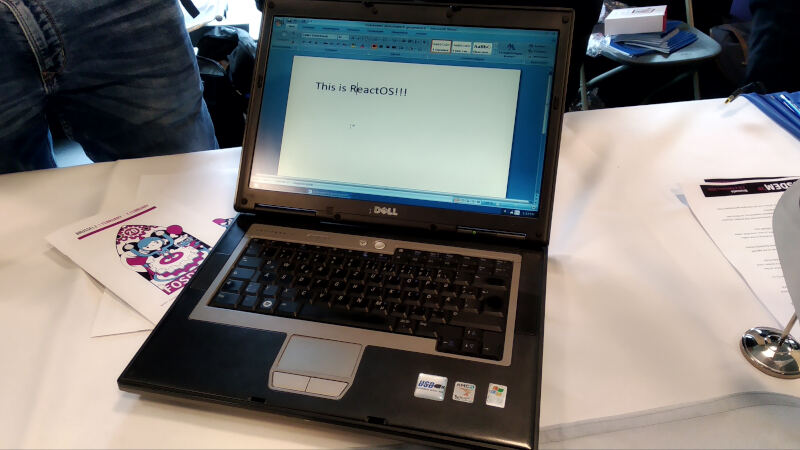
I met some actual ReactOS developers after being interested in the system for a long time. I usually try out new releases in a virtual machine whenever they make a new release to track its progress. I’ve tried it on some physical machines too, but real hardware support is still very sketchy for ReactOS. It turns out that old Dell laptops can actually run ReactOS, the developers say this is pretty much their reference machine and they’re cheap to buy online. Unfortunately the graphics still only run in vesa mode on this hardware so there’s no hardware acceleration. I got ReactOS installed on an old netbook once but when I installed the Intel graphics drivers for Windows it would just blue screen. I asked them why graphics drivers are so difficult, they said that graphics drivers tend to be written in odd ways because it pokes the system in all kind of weird places where it shouldn’t or where you wouldn’t expect it to.
Pinebook at KDE Booth
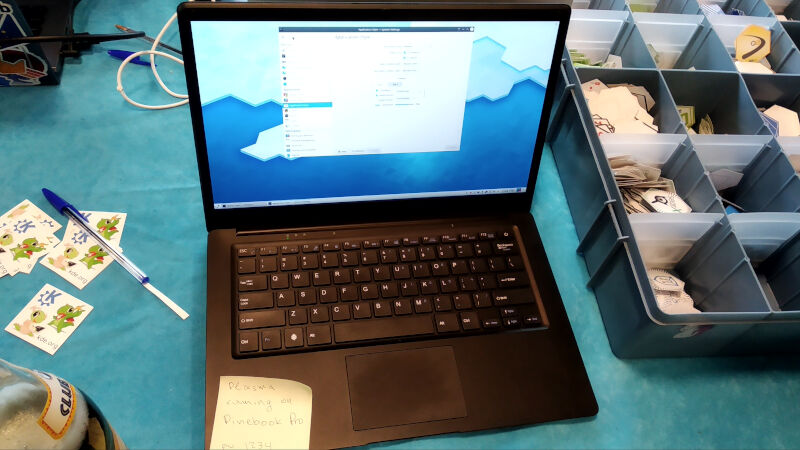
At the KDE booth I saw a Pinebook for the first time. I was quite surprised at both how good the build quality is (you could almost mistake it for Dell Latitude variant) and how fast KDE runs on it. It made me want one, but I’m trying to avoid the temptation of buying more hardware that I probably won’t even use all that much.
I also ended up circling the KDE booth a lot on Sunday in search of Adriaan de Groot, the lead maintainer behind Calamares. He was looking for me too but FOSDEM is just too darn big.
Debian
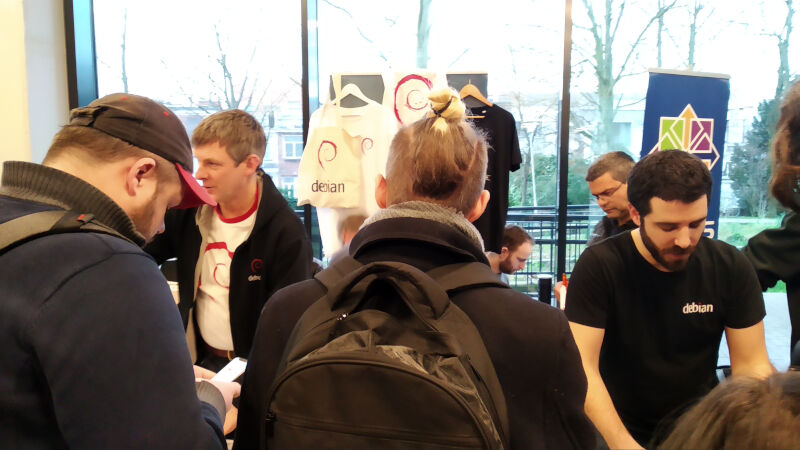
The Debian booth was busy as always, I tried to get a good shot of it but it was not easy.
Debian-Edu
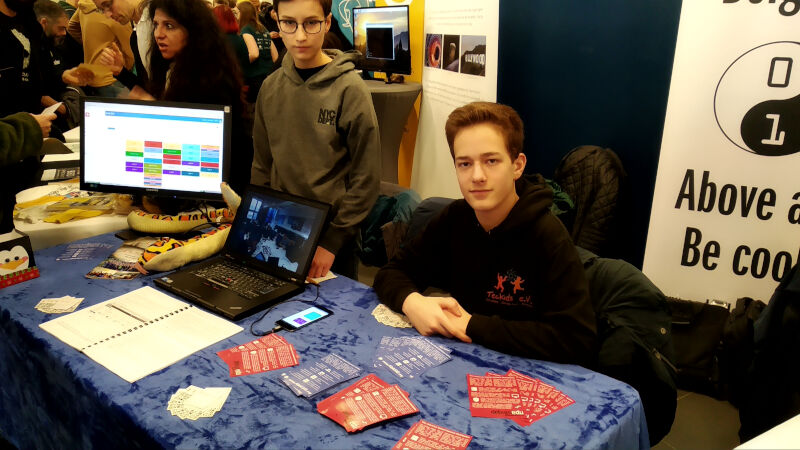
I came across these young people doing a great job of running a Debian-Edu booth, patiently explaining what Debian-Edu is to people who come by to visit the booth. I have no idea who they are and asked Holger if he knows them, he says they seem to know who he is but he doesn’t know them. They got very engaged in conversations with booth visitors so I decided not to bother them too much at that point and come back to chat later, but FOSDEM gets really busy so I didn’t get the chance.
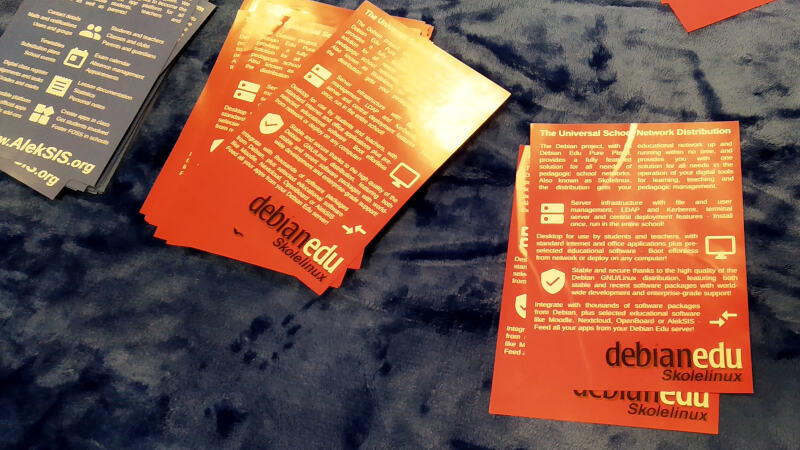
LPI Booth
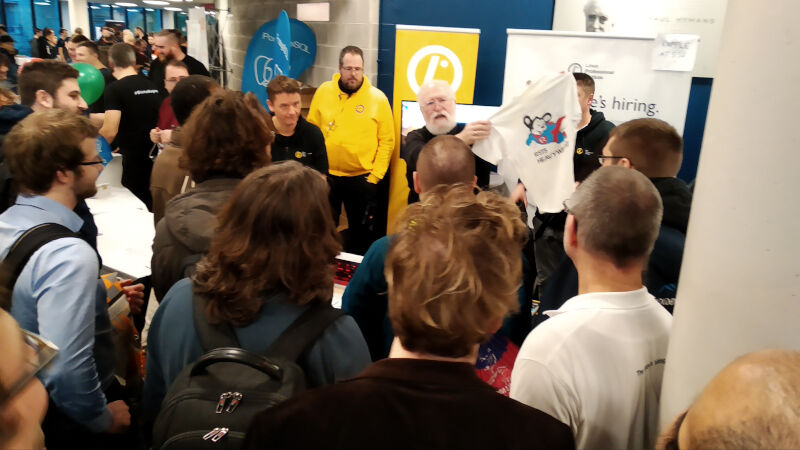
I meant to say hi to Jon “maddog” Hall too, but syncing our available free time proved to be tough. I saw him here explaining when he got this t-shirt and why it was significant, I couldn’t really hear so well from the back since the hall was quite noisy at that point. I’ll ask him about that when I talk to him again on our next video interview.
Haiku
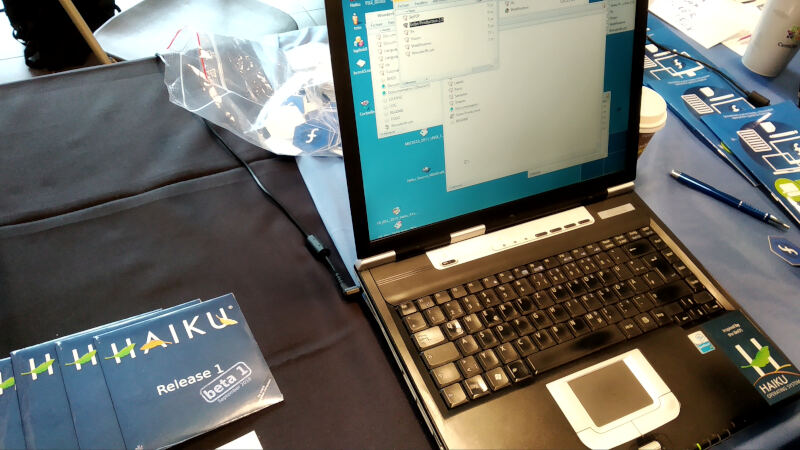
Back in the 90’s I had high hopes for BeOS (which was soon bought by Palm Inc as it rose in populatrity), now reborn as a free software operating system known as Haiku. I got a Haiku CD that I’ll try on an old laptop that should run it well on.
Nuspell
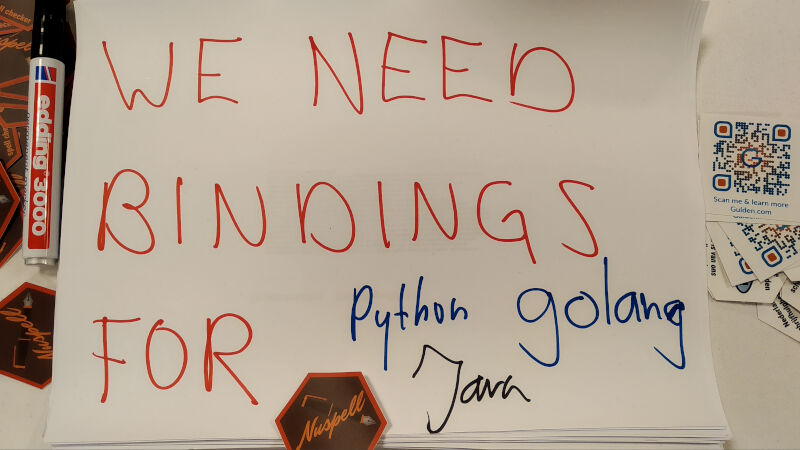
The Nuspell developers ran a booth and was at the MiniDebCamp before FOSDEM too. They are writing a standalone spell checker that can be integrated into other applications so that this work doesn’t have to be re-invented for every app. They are looking for people to help write bindings for Python, Golang and Java. I’m just passing on the message, if you want to help, get in touch with them.
More random stuff
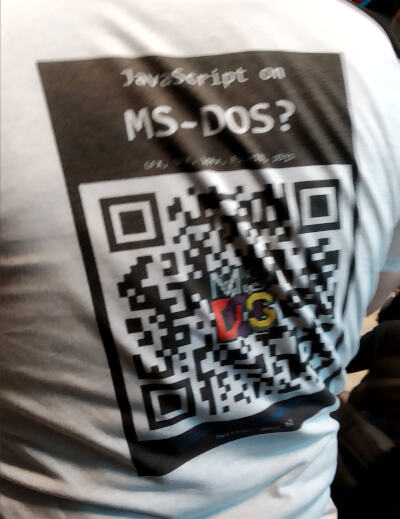
I noticed this “JavaScript on MS-DOS?” t-shirt which caught my attention. After some quick searching (didn’t try the QR code) I found this Adafruit blog entry which led me to it’s GitHub repository. I like to play with old computers and I’m kind of curious how this will run on an actual DOS machine (something that I even have!).
Unrelated, but I also came across JS-DOS 6.22, a DOS emulator written in JavaScript. So I guess you could run JavaScript in a DOS emulator running on JavaScript.
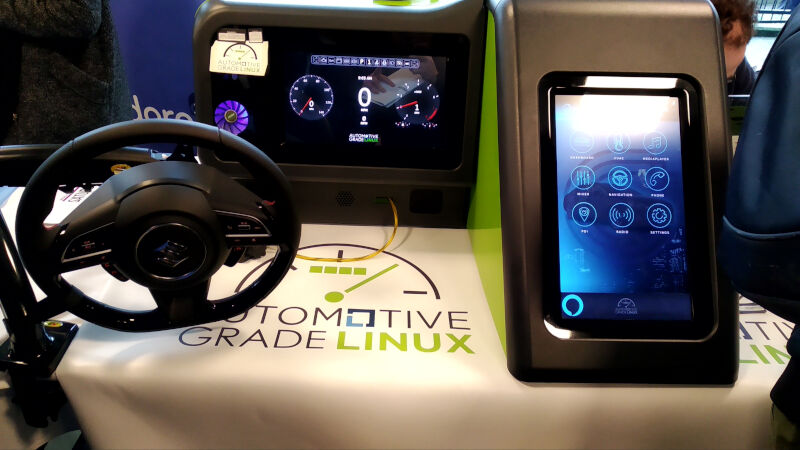
I didn’t have time to ask any questions at the Automotive Grade Linux booth, but they had an extensive setup that seemed to emulate the electronics on a Suzuki dashboard.

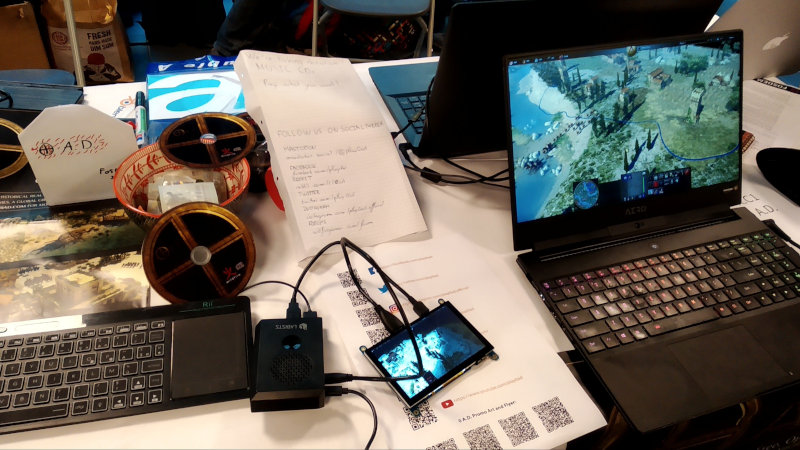
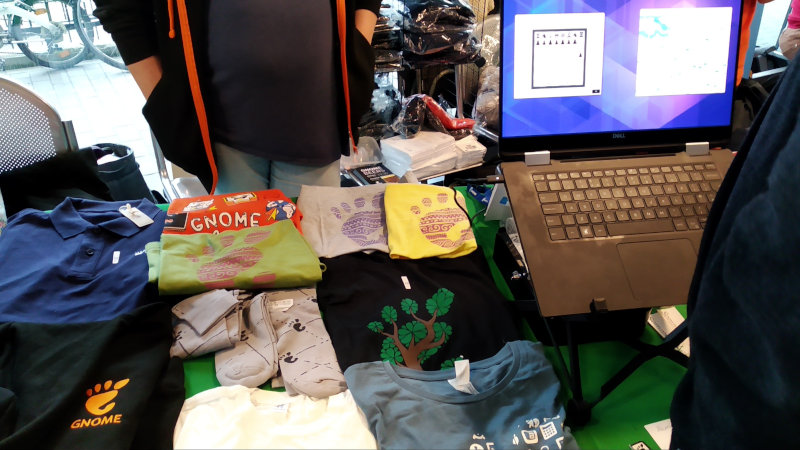
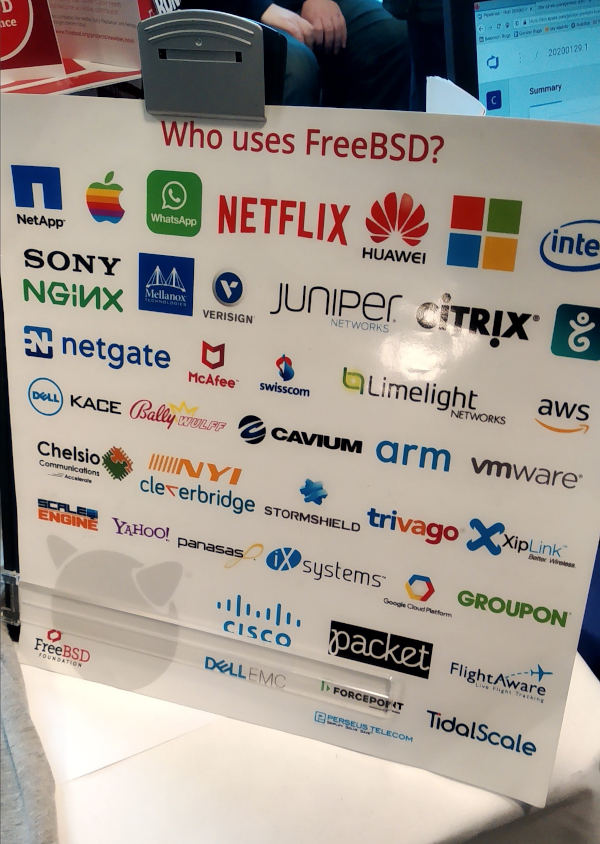
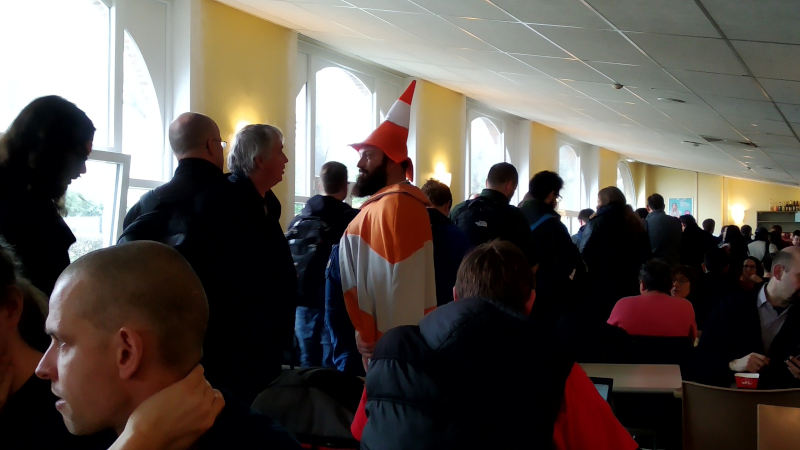
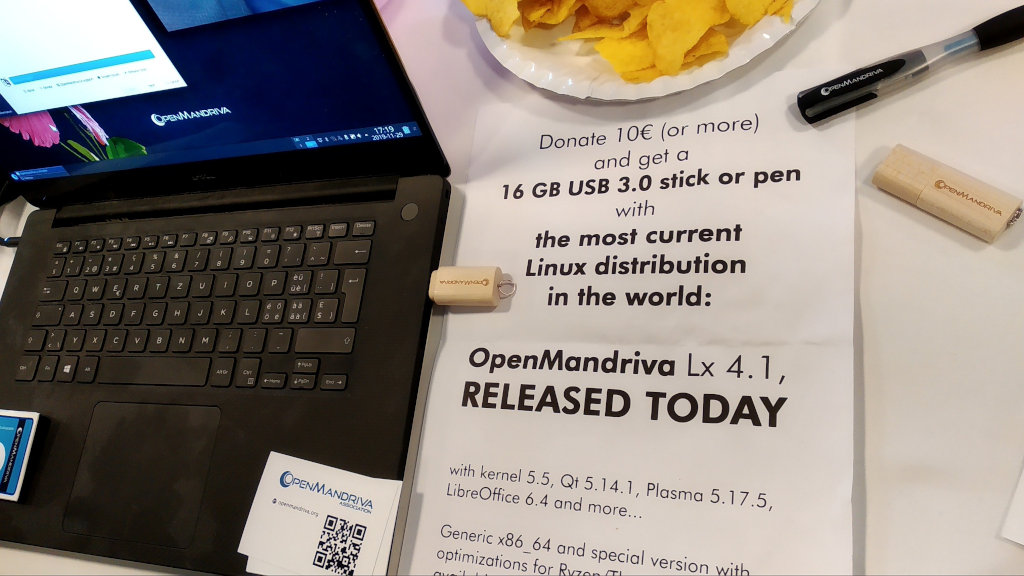
FOSDEM Videos
My photos above mostly only cover a part of the K building during the FOSDEM event, a large amount of videos will soon be released covering the talks of the event. Status of videos is available on this year’s FOSDEM page.
UPDATE: Videos are now live at https://fosdem.org/2020/schedule/events/




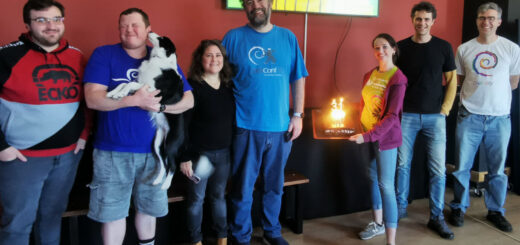
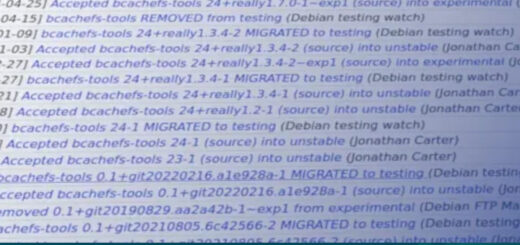


After owning a Firefox phone and later on a Ubuntu phone, which were both vastly underpowered and slow I am very excited to hear good things, and that you had a fast and responsive experience with the Librem. Looking forward to hearing more once people receive their orders.
Looks so much fun and nerd stuff. Need to visit FOSDEM next year. Greets to my friends there.
The young guy at the Debian Edu booth is the same who presented this year and in 2018:
https://fosdem.org/2020/schedule/event/edufoss/